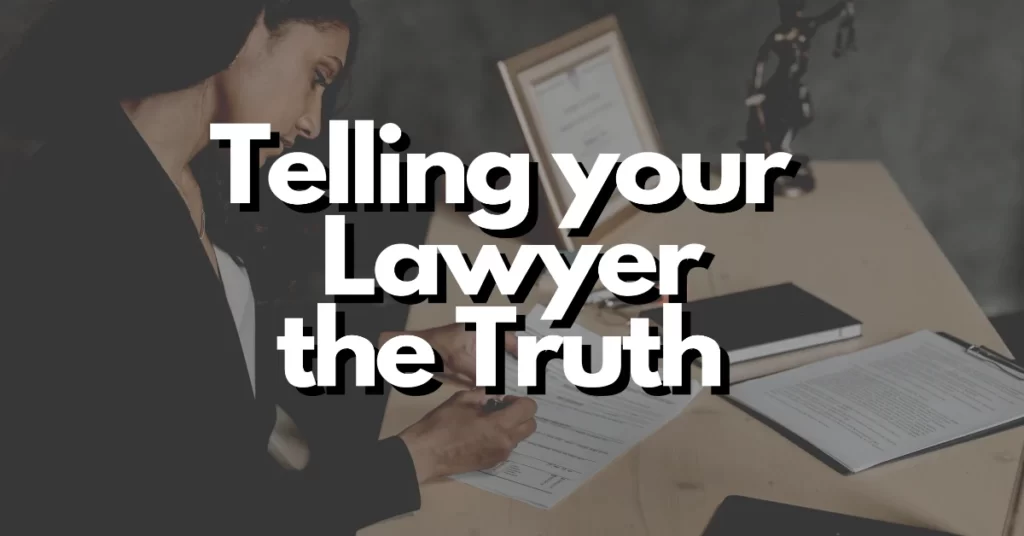When faced with legal issues, one of the most critical aspects of your relationship with your attorney is the level of trust and open communication. You might wonder, “Should I tell my lawyer everything?”.
In this article, we will explore the significance of full disclosure in legal matters, why honesty is crucial, and how maintaining transparency can significantly impact the outcome of your case.
Why Honesty Matters in Legal Matters
Honesty is the cornerstone of the attorney-client relationship. Your lawyer’s ability to represent your interests effectively depends on having a complete and accurate understanding of your situation. Here are several reasons why honesty is essential when working with an attorney:
Legal Strategy: Your attorney relies on the information you provide to develop a legal strategy tailored to your specific circumstances. Withholding critical details or providing inaccurate information can hinder their ability to devise an effective plan.
Risk Assessment: Lawyers need a clear picture of the potential risks and challenges associated with your case. This includes any weaknesses in your position, adverse evidence, or unfavorable circumstances. Open communication allows them to assess these risks accurately.
Ethical and Legal Obligations: Attorneys are bound by ethical and legal obligations to act in your best interests. However, they must also adhere to the law and professional conduct rules. Full disclosure helps your lawyer navigate these responsibilities effectively.
Protection from Surprises: Legal proceedings can be unpredictable, and unexpected developments may arise. By sharing all relevant information, you empower your attorney to respond proactively to surprises and unforeseen challenges.
Attorney-Client Privilege: Communications between you and your attorney are typically protected by attorney-client privilege. This means that, in most cases, these conversations cannot be disclosed to third parties, further encouraging open and honest dialogue.
What to Share with Your Lawyer
Understanding the importance of honesty is one thing, but knowing what to share with your attorney is equally crucial. Here are some key areas where full disclosure is especially vital:
1. Past Criminal History: If you have a prior criminal record, it’s essential to inform your attorney. This information can significantly impact your case, particularly if you’re facing criminal charges.
2. Financial Information: Whether you’re dealing with bankruptcy, divorce, or business litigation, complete financial disclosure is necessary. This includes assets, debts, income, and expenses.
3. Conflicts of Interest: If you are aware of any conflicts of interest that your attorney should be aware of, disclose them promptly. This could involve relationships with opposing parties, witnesses, or others involved in your case.
4. Medical History: In personal injury cases, your medical history can be relevant. Disclose any pre-existing medical conditions, injuries, or treatment you’ve received.
5. Relevant Communications: Share copies of emails, text messages, or any other correspondence related to your case. This documentation can provide critical evidence.
6. Changes in Circumstances: Inform your attorney of any significant changes in your situation that could affect the legal matter. This could include changes in employment, living arrangements, or marital status.
Consequences of Withholding Information
Failing to disclose critical information to your attorney can have severe consequences. Here are some potential drawbacks of not being forthcoming:
Legal Missteps: Your attorney may make strategic decisions based on incomplete or inaccurate information, potentially leading to legal missteps.
Weak Defense or Position: In criminal cases, withholding information can weaken your defense. In civil matters, it can harm your position and potentially lead to unfavorable outcomes.
Ethical Issues: If your lawyer discovers that you’ve been dishonest or omitted essential details, they may face ethical dilemmas. This could result in conflicts that impact their ability to represent you effectively.
Legal Malpractice Claims: In some cases, clients who suffer negative consequences due to their attorney’s actions may pursue legal malpractice claims if they believe their lawyer acted negligently.
Conclusion
In legal matters, the importance of telling your lawyer everything cannot be overstated. Open and honest communication is the foundation of a successful attorney-client relationship and a key factor in achieving a favorable outcome in your case. Remember that your attorney is bound by confidentiality, so you can speak freely about your situation.
By providing complete and accurate information, you empower your lawyer to navigate the complexities of your legal matter effectively, make informed decisions, and advocate for your best interests. Ultimately, the trust and transparency you maintain with your attorney can significantly impact the resolution of your case.

